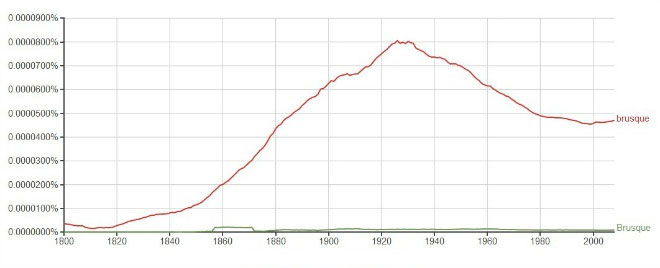A history of ‘brusqueness,’ 1800 to the present

The occurrence of the word “brusque” in books and magazines, 1800 to the present. (Google Ngrams)
Is “brusque” the new “bossy”? Is “bossy” the new “lean in”? In the wake of Jill Abramson’s abrupt — some might say brusque — firing from the top job at the New York Times, many observers of the feminist and linguistic persuasions are taking a second look at the words we use to describe female leaders. Particularly that one word — so odd, so anachronistic — casually dropped twice in the New Yorker’s 2011 profile of Abramson, and again in the magazine’s update on why she was fired.
“The reason Sulzberger originally hesitated to appoint Abramson as executive editor,” Ken Auletta writes, “was a worry about her sometimes brusque manner.”
Brusque manner! We also describe men’s mannerisms that way, but we tend not to worry so much about those. After all, the word brusque, literally defined, means “markedly short and abrupt,” or “blunt in manner or speech often to the point of ungracious harshness.” It comes from the French, which comes from the Italian, which comes from the Latin bruscus — n., Butcher’s Broom, a stiff, spine-tipped plant also used as a laxative.
Men, of course, can be stiff. Women must be “gracious.”